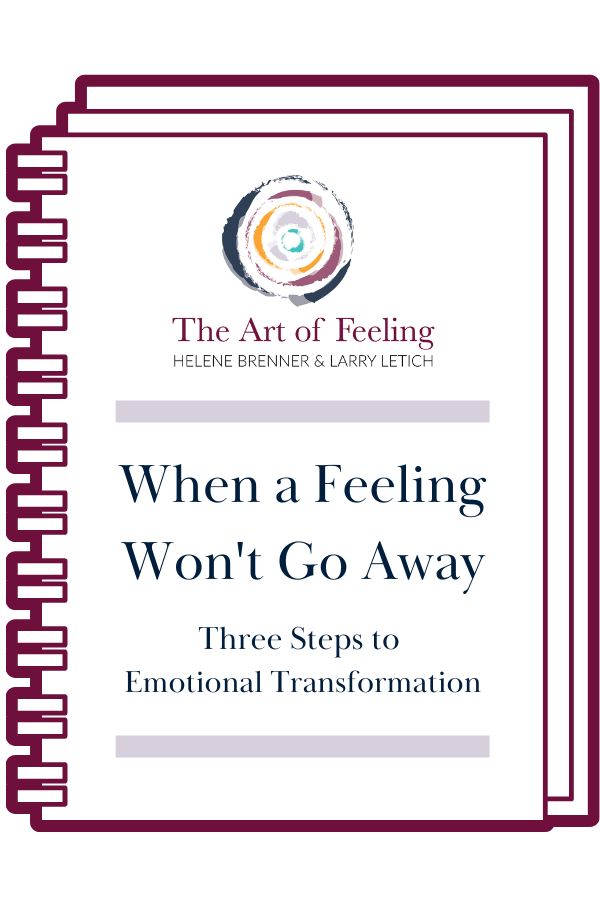What do you do when you’re feeling an emotion you don’t like feeling, or don’t think you “should” feel?
If you’re like – well, practically everybody – you try to make yourself stop feeling that way. You’ll argue with yourself or try to talk yourself out of how you’re feeling. (“Well, it’s simply ridiculous to get upset over that.”) You’ll try to minimize how you’re feeling to yourself. (“I’m not really hurt. I’m just…a little…bothered. It’s no big deal.”) Or you may even deny the feeling you’re having, even to the point of blocking it out completely. (“I’m not mad at all. I never get mad.”)
There’s nothing wrong with doing these things. Oftentimes they work. A transitory annoyance or upset goes away.
Frequently, however, unwanted thoughts and emotions arising from your inner self need and deserve more attention and recognition than this. Persistent emotions don’t simply get denied or reasoned away. Often they’ll get stronger, or go away and come back.
That’s because they may be messengers from your inner self that have something very important they’re trying to tell you, even if, on one level, they seem “wrong.” Repeatedly cutting off your inner experience from them makes it harder to hear your Inner Voice.
So what do you do? You don’t want to simply let your least favorite feelings take you over and overwhelm you. Fortunately, there is a way to be with whatever is going on inside you in a way that brings clarity, and even transformation. In this way, you can make all of your emotions, not just the “good” ones, work for you rather than against you.
I call it “The ABCs of the Inner Voice: “Acknowledging, Being With, and Compassion.
Acknowledging
Acknowledging is the act of bringing to your conscious awareness whatever is going on inside you in the present moment, exactly how you are experiencing it, without judging it, changing it or fixing it in any way. It’s noticing your thoughts, feelings, sensations and desires and letting them be there exactly the way there.
You may be afraid of acknowledging ‘negative’ emotions such as fear or anger because you think that such feelings, once acknowledged, will ‘take over.’ But in fact, the opposite is true. By allowing them, they are free to be felt and pass. By fighting them, they remain with you.
Being With
Being With is spending time with your inner experience — a half-minute, a minute, or five or ten. It’s “hanging out” with it, “keeping it company,” in an interested, accepting, gently curious and friendly way, like  you would with a friend who’s coming over for coffee or tea, without any expectation that you will change it.
you would with a friend who’s coming over for coffee or tea, without any expectation that you will change it.
We all want to be listened to. But strangely enough, a lot of pain comes from the way in which we don’t listen to ourselves. You know what a difference it makes when you can share a painful feeling with someone who truly knows how to listen lovingly and caringly. It can make even a tragedy feel bearable. In the same way, Being With allows you to keep company with aspects of yourself in a way that makes growth and healing possible. Sometimes all it takes is a minute or two of calmly Being With an upsetting inner emotion inside you for you to feel calmer and more in harmony with yourself.
Compassion
Compassion is extending compassion and empathy to those inner parts or places within you that are sad, hurting, scared, angry or upset. It’s recognizing that they have a good (that is, understandable) reason for the way they feel, even if you don’t know what it is yet, and even if, on another level, you disagree with their reasoning. Trying to argue with them to change how those inner places feel is never as effective as extending compassion and understanding to them. When compassion is extended to any part of your self that is stuck in suffering, that part begins to heal.
Compassion has many names. Gentleness. Empathy. Tenderness. Loving-kindness. Even softness. Compassion, especially self-compassion, is at the very heart of living from your inner voice. Nothing can be accomplished without it; with it, you can bring about miracles. Extend compassion toward the hurt, angry and fearful places, the vulnerable places, the foolish places, the clumsy and “defective” places, and even the darkest, most unacceptable places inside of yourself and others, and you’ll begin to feel a peace, calm and presence within you that you can barely imagine.
Now You Try It
Try this sometime this week. At a moment when you’re feeling some upsetting emotion, instead of getting lost in it, or pushing it away and telling yourself why you shouldn’t have it, apply the ABCs. Acknowledge the feeling to yourself nonjudgmentally, exactly as it is, without trying to change it. Then Be with it, sit down with it like it’s a good friend, and let it hang out with you. As you’re with it, notice the feeling of it in your body. A few minutes of this, or even less, may be all that’s needed. Finally, extend to it the kind of Compassion and empathy you would give to a person you care a lot about who is hurting. Give to yourself the compassion and empathy that you know would feel really good if you received it from someone else. Of course, it’s so important to receive love and compassion from others, but it makes a big difference when we give it to ourselves.
All of this can take as little as five or ten minutes, and often even less, but it can make a world of difference. It can even lead to a profound shift in whatever upsetting feeling you were having. Try it and see.—Excerpted and adapted from I Know I’m in There Somewhere: A Woman’s Guide to Finding Her Inner Voice and Living a Life of Authenticity by Helene Brenner by permission of Gotham Books, a division of Penguin Group (USA) Inc. Copyright © 2003 by Helene Brenner. All rights reserved. This excerpt, or any parts thereof, may not be reproduced without permission.


 We’re Helene Brenner and Larry Letich. Helene is a licensed psychologist in private practice for more than 30 years. Larry is an individual and couples therapist. Besides being therapists, we’re co-authors and partners in life and love for more than four decades.
We’re Helene Brenner and Larry Letich. Helene is a licensed psychologist in private practice for more than 30 years. Larry is an individual and couples therapist. Besides being therapists, we’re co-authors and partners in life and love for more than four decades. 

0 Comments